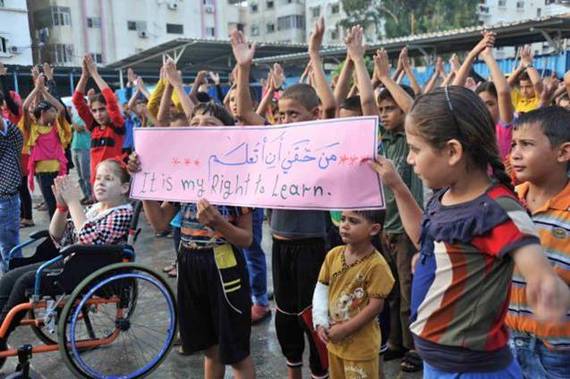Human Rights Day has a unique significance for over half a million children educated daily in hundreds of United Nations schools across the Middle East. It is a moment of hope and potentially of despair, when many of our students and more than 20,000 education staff will look at the rights enshrined in the Universal Declaration and wonder why so many of them are denied to themselves and those they teach. We educate students living under blockade in war-ravaged Gaza, under occupation in the West Bank, in the refugee camps in Jordan and Lebanon and amid civil war in Syria. There are many challenges to ensuring these children receive the best education they can, but through dedication and a school environment that promotes their well-being and helps realize their full potential, they can succeed. Today is also a day when we join together and renew our commitment to work for the universal respect of human rights. It is a day on which we advocate for our own rights to be respected and pledge not to violate the rights of others.
It is not only UN agencies, human rights organization, civil society groups and high profile individuals who advocate for rights across the Middle East. It is also refugee students themselves who are at the center of our rights initiatives. UNRWA works to empower students to advocate and promote a culture of human rights despite the challenges they face. This very day, in 687 United Nations-run schools in Syria, Lebanon, Jordan, the West Bank and the Gaza Strip, children will advocate for human rights principles. Human Rights Education in UNRWA schools enables students to critically reflect on ways they can contribute to the realization of rights and contribute directly to their society and global community in positive ways.
A perfect example of the values we try to promote through this program can be found in Shuruk Saadi, a Palestine refugee living in Jordan. At just 16 years old, Shuruk is a human rights advocate, promoting tolerance and equality. As a democratically elected member of her School Parliament, Shuruk has worked on projects supporting gender equality and promoting equal access to education. Shuruk is an inspiring young lady who is able to transmit her passion for human rights to an entire community. Upon graduating from her school, she told her peers "You have to continue what I started and advocate for respect and tolerance." There are other "Shuruks" in UNRWA schools who instill hope for the future.

Source: UNRWA
As a United Nations agency, we see an opportunity to build resilience through education. When people understand the values of human rights -- and truly accept and live these values -- it can go a long way to promote peace, respect and tolerance. With the generous support of the United States Government, for nearly 15 years we have been able to work to help Palestine refugees to adopt human rights principles and values into their own lives. In all our schools, we enhance the regular curriculum with a Human Rights, Conflict Resolution and Tolerance Education Toolkit, taught in all our grades, unpacking the Universal Declaration, reinforcing the message that yes, everybody's rights must be respected, but we also have an obligation to respect the rights of others.
Every day, the students in UNRWA schools struggle with difficult challenges. Close to 100 percent of our students in Gaza suffer from mild to serious post-traumatic stress disorder (PTSD) from living through three wars over the last six years. Many have lost their homes, parents, siblings, friends or neighbors. Many have been injured themselves, and 138 of our students in Gaza never returned from summer break after paying the ultimate price for the failure to protect their rights. An additional 814 were injured and 560 have lost one or both parents. In Syria, our students are severely affected by the conflict. And yet they still come to school because they know how important education is to their futures. As young leaders of tomorrow, our children are committed to working towards the fulfillment of rights even when those rights are challenged daily.
Teaching human rights in the context of today's Middle East is a daunting task, given the rising tide of extremism and the impact of the prevailing narratives that inform the public discourse. Children are impressionable and easily influenced. Our students see violence around them on a daily basis. But we in UNRWA remain committed to the ideal of human rights for all. We teach it in our classrooms. We encourage our children to live it in their lives. Today, on Human Rights Day, we hope that tomorrow will be a better day for the communities UNRWA seeks to help. We hope that the determination of young Shuruk and others like her will go a long way to spreading a culture of tolerance and protection of human rights.